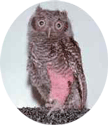Center |
|
Helpline: (352) 371-4400 |
Hospital & Rehab |
Cooperative WorkFWC has always cooperatively with local agencies and nonprofit such as Alachua County Animal Service, Santa Fe Community College, and the University of Florida School of Veterinary Medicine.
|
 Once FWC determines that an animal needs help, it is received by trained volunteers. When an injured,sick,orphaned or displaced animal arrives at the center, we record information about its history including who handled the animal, species, age, and condition. Each animal is given a complete medical examination, stabilized, and medically treated. Once FWC determines that an animal needs help, it is received by trained volunteers. When an injured,sick,orphaned or displaced animal arrives at the center, we record information about its history including who handled the animal, species, age, and condition. Each animal is given a complete medical examination, stabilized, and medically treated.Next, the animal receives an examination and initial treatment from FWC's director or senior staff member. Once its condition is stable, FWC volunteers follow a prescribed course of treatment for the animal until it is ready for release. Release FWC takes great care to ensure that wildlife is returned to the wild. When an animal is ready for release, we return it to its original location or to a safer habitat in that vicinity. If it is a migratory bird it will be released in an area the others of the same species can be found. |
Squirrel CareFWC maintain an active squirrel fostering program. As part of our ongoing educational outreach programs, FWC offers frequent squirrel-raising classes to the general public. Eastern Grey Squirrels and Southern Flying Squirrels that are to be raised for release back to the wild must be under the supervision of a permitted rehabilitator. Those FWC requires that our rehabilitators take the special class. In this way, we ensure high quality care for animals in the program. FWC's Squirrel Coordinator offers home and center-based trainings for individuals who cannot attend evening classes, and FWC volunteers are available during business hours to answer questions. Non-Native Wildlife & Large AnimalsFWC does not rehabilitate non-native wildlife, but does direct callers to agencies who will provide these animals with proper care. Florida Wildlife Care works with all our native Florida wildlife. We admit everything from larger avians: wading birds owls and hawks; to mammals of every size: foxes, deer, bobcats, opossums, squirrels, mice and rats, rabbits, and raccoons. We also accept all kinds reptiles and yes even amphibians. Licensing & AccreditationFlorida Wildlife Care operates in accordance with federal, state, and local laws, regulations, ordinances and statutes, maintaining permits issued by the Florida Fish & Wildlife Conservation Commission, the US Fish and Wildlife Service and the US Department of Agriculture. These permits cover all of FWC's rehabilitation and education projects. FWC meets or exceeds these agencies' requirements on housing, medical care, husbandry, and documentation. We are subject to inspections and must report annually to these agencies. FWC is working toward accreditation by the International Wildlife Rehabilitators Council and the National Rehabilitators Association.
|
|
| About Us | Site Map | Privacy Policy | Contact Us | ©2004 Florida Wildlife Care Center, Inc. | |
| Florida Wildlife Care is a nonprofit organization dedicated to the care and conservation of native wildlife and habitat in Florida through education, rehabilitation and study. |